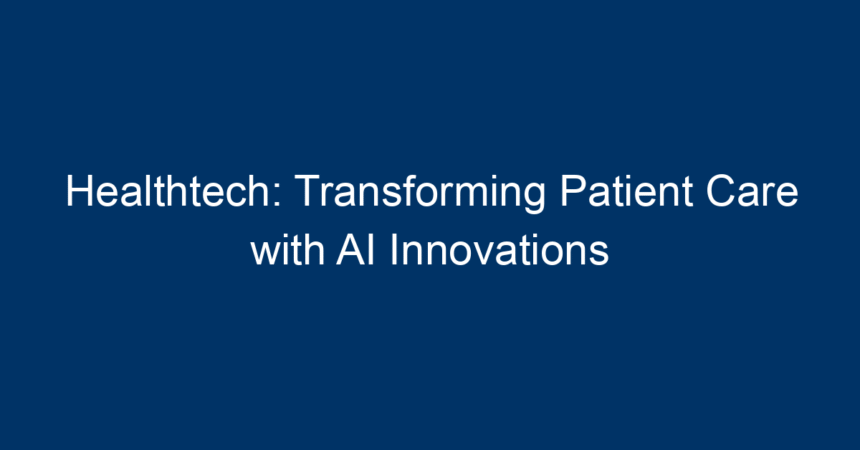The healthcare industry is witnessing a seismic shift as technology evolves at an unprecedented pace. At the forefront of this revolution is healthtech, a burgeoning field that effectively merges healthcare with innovative technologies, particularly artificial intelligence (AI). As healthcare providers strive to improve patient outcomes, reduce costs, and enhance operational efficiencies, AI-driven healthtech solutions are paving the way for a promising future. In this article, we will explore how healthtech is transforming patient care through AI innovations, highlighting key applications, benefits, challenges, and actionable insights for stakeholders.
Understanding Healthtech and Its Importance
Healthtech encompasses a wide array of technologies designed to enhance the quality and efficiency of patient care. From telemedicine to wearable devices, healthtech solutions aim to streamline healthcare processes and improve access to medical services. In recent years, the integration of AI has taken healthtech to new heights, empowering healthcare providers to make data-driven decisions and delivering personalized care to patients.
The Role of AI in Healthtech
AI is a powerful tool that can analyze vast datasets to produce insights that would be impossible for humans to achieve alone. In the context of healthtech, AI can:
- Predict Patient Outcomes: By analyzing historical patient data, AI algorithms can predict potential health issues, enabling preventative care measures.
- Enhance Diagnostic Accuracy: AI can assist medical professionals in diagnosing diseases more accurately and swiftly, thus improving treatment timelines.
- Optimize Treatment Plans: Machine learning algorithms can suggest personalized treatment plans based on a patient’s unique genetic makeup and medical history.
How AI Innovations Are Changing Patient Care
1. Predictive Analytics and Risk Stratification
Predictive analytics is transforming how healthcare providers approach patient care. By analyzing data from electronic health records (EHRs), wearable devices, and even genetic information, healthtech solutions can identify high-risk patients before conditions escalate. This proactive approach leads to timely interventions, reducing hospital admissions and improving patient outcomes.
For example, healthtech innovations such as remote monitoring tools can track vital signs in real-time, alerting caregivers to potential issues before they become critical. This can be particularly beneficial in managing chronic illnesses such as diabetes or heart disease, where early intervention is critical.
2. AI-Powered Diagnostics
AI technologies are making substantial strides in diagnostics, particularly in radiology, pathology, and dermatology. Image recognition algorithms can analyze medical images with remarkable accuracy, often outperforming human specialists. For instance, AI-driven software can detect tumors in radiology scans and alert clinicians, facilitating early treatment.
Organizations are increasingly using healthtech solutions that offer AI capabilities to assist in diagnosing complex diseases. By integrating these tools into standard practice, healthcare providers are not only improving diagnostic accuracy but also reducing the time it takes for patients to receive critical care.
3. Personalized Medicine
One of the most exciting advancements in healthtech is the move toward personalized medicine. AI algorithms analyze a patient’s genetic makeup, lifestyle, and preferences to create tailored treatment plans. This approach goes beyond generic therapies by considering individual responses to specific medications.
For instance, oncology has witnessed tremendous advancements with the introduction of AI in healthtech, where personalized treatment plans based on genetic profiling can lead to better patient outcomes. This represents a shift away from the one-size-fits-all model, fostering a more patient-centric approach in treatment.
4. Telemedicine and Virtual Care
The COVID-19 pandemic accelerated the adoption of telemedicine, but healthtech innovations are taking virtual care a step further. AI-driven chatbots and virtual health assistants enable patients to access medical advice and information without the need for in-person visits.
By employing natural language processing (NLP) capabilities, these AI tools can respond to patient inquiries, schedule appointments, and even provide basic diagnoses. This not only improves accessibility for patients but also allows healthcare providers to allocate their time more efficiently.
Challenges in Implementing AI in Healthtech
While the benefits of AI innovations in healthtech are clear, several challenges must be addressed:
1. Data Privacy and Security
The integration of AI into healthtech requires access to an immense amount of sensitive patient data. Ensuring data privacy and security is paramount. Healthcare organizations must navigate complex regulations to protect patient information while leveraging data for AI-driven solutions.
2. Integration with Existing Systems
Many healthcare systems use legacy technology that can be challenging to integrate with new AI tools. A successful transition involves larger infrastructure investments and comprehensive training programs for healthcare professionals.
3. Resistance to Change
Cultural resistance within healthcare organizations can impede the adoption of new technologies. Educating stakeholders about the potential of AI and providing hands-on experience can address these concerns and foster acceptance.
Future Trends in Healthtech and AI
The future of healthtech is rich with potential as AI continues to evolve. Here are some trends to watch for:
-
Augmented Reality and AI Training: Utilizing augmented reality (AR) alongside AI can revolutionize medical training by providing immersive experiences for healthcare professionals.
-
Blockchain Technology: Implementing blockchain for patient data management can enhance transparency and security in healthtech, making data sharing safer.
- AI in Drug Discovery: AI algorithms are being used to sift through chemical databases to identify potential drug candidates at a fraction of the time and cost.
Actionable Insights for Healthcare Stakeholders
-
Invest in Training: Ensure healthcare professionals receive adequate training in using AI-powered healthtech tools to maximize the technology’s benefits.
-
Adopt a Patient-Centric Approach: Strive to incorporate AI solutions that enhance patient experience and care through personalization and accessibility.
-
Prioritize Data Security: Implement stringent data protection measures to safeguard patient information while adopting new technologies.
-
Foster Collaboration: Collaborate with tech providers, researchers, and other stakeholders to stay ahead of the curve and effectively integrate AI innovations into healthcare practices.
- Stay Informed: Keep abreast of emerging healthtech trends and advancements to remain competitive and responsive to patient needs.
Conclusion
The integration of AI innovations into healthtech is not just a trend; it is a fundamental transformation in how patient care is delivered. As healthcare providers embrace these technologies, the focus remains firmly on improving patient outcomes, enhancing operational efficiency, and facilitating seamless access to care. By overcoming challenges and adopting a proactive approach, stakeholders can harness the power of healthtech to revolutionize the healthcare landscape for generations to come. Embracing these innovations today paves the way for a healthier, more efficient tomorrow.




